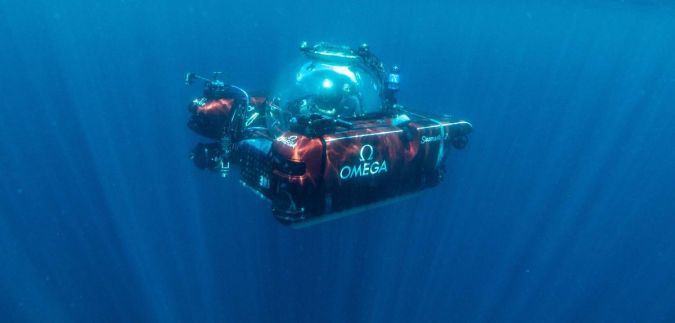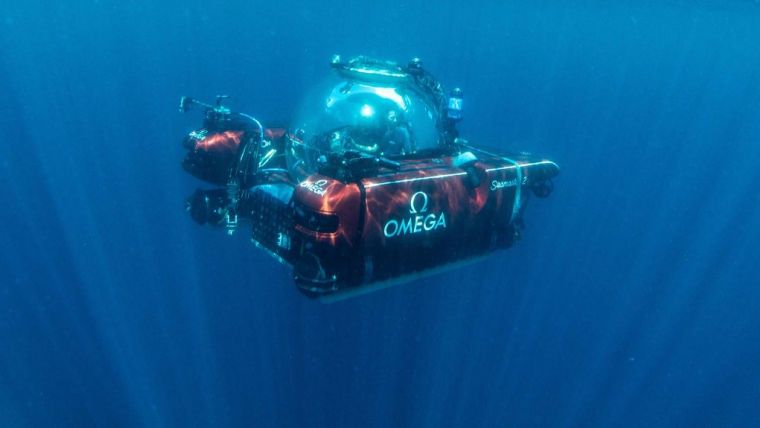Advanced Deep-sea Expedition to Maldives Gets Underway
Oxford University researchers are playing a key role in the first systematic survey of ocean life in the Maldives, from the surface to 1,000 metres deep. This will enable the Maldivian government to develop conservation and sustainable development policies so that the oceans continue to protect and provide for the Maldivian people.
Taking place between 4 September and 7 October, the Nekton Maldives Mission will deploy two of the most advanced human-occupied submersibles, which make use of robotic and autonomous systems and more than a dozen research technologies. This will make it one of the most technically varied and advanced missions ever undertaken in the Indian Ocean.
Lucy Woodall, associate professor of marine biology at the University of Oxford and principal scientist at Nekton, will lead the international science team. This will draw on her expertise in co-developing marine research expeditions to understand the patterns of biological life in deeper waters and the consequences of human activities on them.
Capturing Environmental Parameters and Benthic Mapping
“This is a very exciting partnership between academic institutions, research foundations and governments. Collaborations like this allow us to design expeditions around the needs of a country and gather the necessary information for them to make the important decisions around conservation and marine protection,” Woodall stated. “Deep-sea research is an area of science that we have barely scratched the surface of. This expedition will allow us to develop themes of important research priorities, by capturing environmental parameters and carrying out benthic mapping for the very first time in this area of the world.”
Coordinated and managed by Nekton, a not-for-profit research institute based at Begbroke Science Park in Oxford, the expedition is a truly international endeavour, involving a global alliance of 40 organizations with a scientific team drawn from the Maldives, the UK, the Seychelles, India, Sri Lanka, South Africa, Spain, Greece, the Netherlands and Ireland. Ten Maldivian marine scientists have been selected to be the first Maldivian aquanauts to lead over 30 descents in the mission’s high-tech submersibles, with the first descent of the mission to be led by an all-women team. The Maldivian aquanauts are to be announced at a press conference in Male on 1 September.
Oliver Steeds, mission director and chief executive at Nekton, said: “Far from being an example of ‘parachute science’, where local researchers are sidelined from field studies conducted in their own countries, this entire mission is co-defined and co-delivered with Maldivian partners to meet their national priorities to establish new protected areas across at least 20% of their oceans and to sustainably develop their blue economy.”
Specific Aims
The survey has various specific aims, which include determining the location, health and resilience of the coral reefs that are essential to life in the Maldives and exploring the largely unknown and unprotected deep corals and reefs of the Rariphotic Zone, which acts as a refuge for animals from shallower waters. The mission will also investigate the relative abundance of the 40 shark and 18 ray species at the apex of the food chain in the Maldives ocean, which is a critical indicator of ocean health, as well as investigating how ocean life adapted to historic rising sea levels caused by ice melt from the last Ice Age. The project will also conduct the first mapping survey of a subsea mountain in the Northern Indian Ocean.

Researchers from Oxford University supporting the mission include:
Dr Lucy Woodall, whose research seeks to explore the mechanisms and processes that drive marine biodiversity and to understand the impacts of humans on the marine environment. Working on deep-sea and coastal systems, she has explored many challenges of ecosystem management. Her lab co-designs research with scientists in the countries they work in, to ensure that together they create research that is needed and useable for decision-makers. They use marine expeditions to increase the visibility of the ocean and share its benefits to humankind, as well as to support science and policy-related activities.
Dr Paris Stefanoudis, a marine biologist at Oxford University and senior postdoctoral researcher at Nekton, researches deep-sea and fish community structure and connectivity across depth in tropical coral reef ecosystems. He will lead the visual survey and analysis for the Nekton Maldives Mission.
Professor Alex Rogers will contribute to the field research and support with analysis and publications. His research focuses on applying molecular tools and traditional taxonomy methods to study the evolution of marine organisms, including the impact of environmental factors on the genetic structure of populations. Professor Rogers is also a founding trustee of Nekton and the current science director of REV Ocean, who are generously providing the use of their deep-diving submersible for the mission.
Denise Swanborn is the Maldives Mission expedition manager and, combining logistics, marine operations, science, communications and partner activities, she works across all aspects of the expedition. Denise is a postgraduate student in Oxford’s Department of Earth Sciences. She is in the final stages of her PhD studies at the University of Oxford under the supervision of Dr Lucy Woodall and is part of Nekton’s science team. Her research focuses on the relationship between seabed structural patterns and the occurrence and distribution of deep-sea species and habitats, working with a variety of technological tools.
You can follow the team’s progress throughout the mission on Instagram, Facebook, YouTube and Twitter. As part of their Submarine Live programme, the team will also give a daily, live educational broadcast from their mothership from 27–29 September, freely available to all schools, students and teachers.














